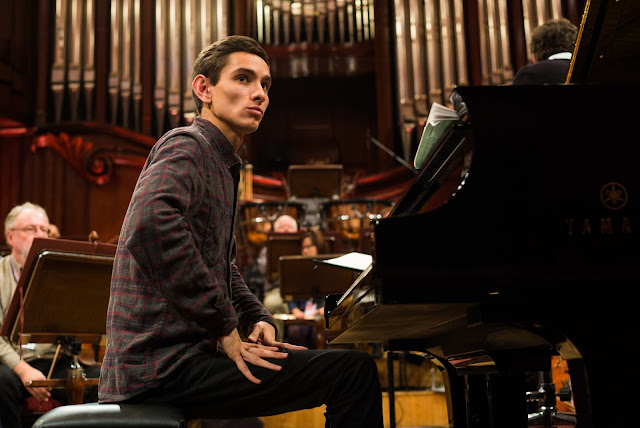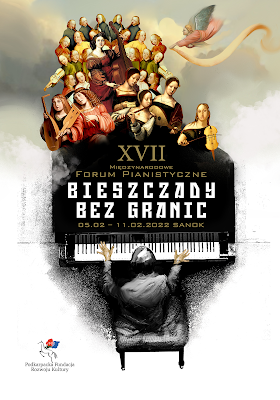Dimitry Shishkin during the 2015 International Fryderyk Chopin Competition, Warsaw
Dimitry Shishkin
2015 International Fryderyk Chopin Competition, Warsaw
I found re-reading my competition review notes of Dimitry Shishkin, winner of the 6th prize during the 17th International Fryderyk Chopin Competition in 2015, rather interesting. It is always instructive to look back at the written record of his performance, particularly in light of his recent magnificent 2nd prize in the 16th International Pyotr Tchaikovsky Competition 2019.
In such an ephemeral art as musical performance, it is always constructive to glance back at past performance impressions when present victories emerge. Possibly the unique value of my modest efforts is at least the preservation of an historical record.
In such an ephemeral art as musical performance, it is always constructive to glance back at past performance impressions when present victories emerge. Possibly the unique value of my modest efforts is at least the preservation of an historical record.

Reflections
on Stage II 9-12 October 2015
Dimitry Shishkin
(Russia)
Next to Eric Lu and Kate Liu by far the most astonishing pianist so far in this competition . He is genuinely in the Richter, Gilels mould of fertile imagination, unique reading of the score and breathtaking virtuosity in performance. Rich tone, rather light touch for a Russian and superb control of dynamics, pedalling and articulation. This was absolutely fantastic playing on every level far beyond what is called mere 'technique' and 'musicality' either in or out of any competition. Packed with electrical excitement. A unique 'voice'.
I have
never heard anything quite like it for years. Really. Unique. He was
already playing short works at the age of 2. He is also a composer. The most
noble, measured, controlled A-flat major Polonaise Op. 53 I have ever
heard - and we have heard some in this competition and out of it! The LH
'military octave spirals' were spellbinding, effortless and hauntingly
threatening. The opening to the B-flat minor Scherzo was the
forbidding question with an answer from the grave just as Chopin desired. An
improvised compositional quality throughout - a player
entirely immersed in his own sound world. 'Authentic' Chopin in
the John Rinkean sense.
Shishkin
is not a profound Chopin poet like Eric Lu but if any pianist was to convince
me of Chopin in a modern dramatic and dynamic style on a Steinway it is was
this pianist. A body attached to a pair of hands.
Here we
have a truly developed artist. A unique 'soul' in
the Dostoevskyian sense. I had the distinct feeling it was as if I
was standing before a Cubist of Fauvist painting by Braque or Cezanne for the
first time. Not sure what exactly to make of it but convinced of its individual
and almost visionary qualities.
A magnificent Stage II. He will take some beating in this competition I can tell you but I have not heard everyone in Stage II yet. Of course the jury decision will be a compromise of sorts and this is never kind to individuality of a high order such as this.
A magnificent Stage II. He will take some beating in this competition I can tell you but I have not heard everyone in Stage II yet. Of course the jury decision will be a compromise of sorts and this is never kind to individuality of a high order such as this.
Reflections
on Stage III 14-16 October 2015
Dimitry Shishkin
(Russia)
This Stage did not compare in individuality and sheer
interpretative courage with his Stages I & II. I felt the Mazurkas
Op. 59 were more imitative of Polish models than was necessary. Of
course he retained the magnificent tone, a refined sound that we do not often
associate with Russian pianists - more French in character. His digital
dexterity is mind bending. The four Impromptus were elegantly brought
off with immense refinement of touch and articulation. I found
his Sonata Op.35 lacking any real sense of an unfolding tragic
destiny, not sufficiently emotionally fractured despite Shishkin's formidable
pianistic qualities. Finalist.
Reflections
on the Final 20 October 2015
Dimitry Shiskin (Russia)
As I
had anticipated, this was a profoundly creative performance of the E minor Concerto
Op. 11 from the evidence of previous stages of the competition.
This by a pianist of unique personality and character who
had never before played with an orchestra! The rethinking of the
work would not please the professors but satisfied
me immensely. Chopin lives!
I felt
the Allegro maestoso to be a noble
and aristocratic conception, so strong in fact that I could feel the
orchestra and conductor changing their approach to the music as
it unfolded. This continued throughout. I felt the interpretation was
poised and musical in a creative manner not giving us
the standard product of the academies, breaking rules
but not to the detriment of the composition but
bringing forth a new conception. Such unaccustomed visions are bound to upset
those preoccupied with structurally 'correct' expectations and theories set
solid over time. I thought his detailed phrasing musically inspired.
Strong left hand.
The Romance
Larghetto began closer to Largo. But how was Larghetto conceived
in 1830? Can metronome markings be trusted a posteriori ? The
movement had a beautiful, round, golden bel canto singing tone
in this glorious melody. As I said in tone and touch Shiskin sounds more French
in refinement than Russian. He creates a unique sound from the instrument. He
conceived of the movement as a series of episodes loosely linked, like some
great operatic aria of the human spirit expressing itself with the greatest
simplicity. I was very, very moved. I did not feel the movement as 'fractured'
but wonderfully recreated by such an interesting and inventive
episodic approach. Transcendental simplicity emerged for me with magnificently
perceived 'musical' phrasing that revealed hidden treasures.
The Allegro
vivace was crystalline in tone and transparent. Again the effect on
the orchestra of this unaccustomed approach, yet
within acceptable limits, made them play more energetically. His
hands as you watch them seem to have a life of their own, like a scene from a
Surrealist film by Luis Buñuel. The sound of the ecstatic styl
brillant figuration was
like a cascading waterfall. Fabulous.
I heard
in an interview with Shishkin that he is also a painter as well as a composer.
This inherent creativity explains a great deal about his reconception of
this work. As a creative artist he could hardly do otherwise. Creativity is the
fibre of his being. Such an individual invention will not be
to everyone's taste and certainly not in matters of
Chopinesque 'correctness'.
However this stance is perfectly in keeping with the original eighteenth and nineteenth century role of the composer-pianist. The only competitor true to this calling. For me his was a self-consistent vision of great majesty and power, the musical meaning of the design absolutely clear. Shiskin has a great deal to say of unique interest about Chopin's music and in particular this interpretation of a standard work in the repertoire.
However this stance is perfectly in keeping with the original eighteenth and nineteenth century role of the composer-pianist. The only competitor true to this calling. For me his was a self-consistent vision of great majesty and power, the musical meaning of the design absolutely clear. Shiskin has a great deal to say of unique interest about Chopin's music and in particular this interpretation of a standard work in the repertoire.
For my full account of the 17th International Fryderyk Chopin Competition in 2015:
http://www.michael-moran.com/2015/10/17th-international-fryderyk-chopin.html



Comments
Post a Comment